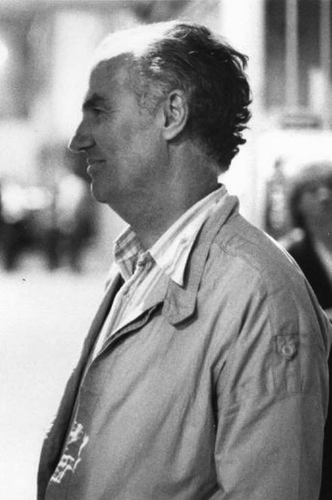Luigi Nono
Italian composer, born January 29, 1924, in Venise, died May 8, 1990, in Venise

D.R.
In concert
La Lontananza - 03.29Played works
La lontananza nostalgica utopica futuraVidéo
Author website
http://www.luiginono.itLuigi Nono, leading Italian composer of electronic, aleatory, and serial music. Nono began his musical studies in 1941 at the Venice Conservatory. He then studied law at the University of Padua, receiving a doctorate there, while at the same time studying with the prominent avant-garde composer Bruno Maderna and the noted conductor Hermann Scherchen. He came to public attention in 1950 with his work Variazioni Canoniche, orchestral variations on a 12-tone theme of Arnold Schœnberg, whose daughter Nuria he married in 1955. He continued to explore avant-garde techniques and lectured widely in Europe and the United States. He also taught at the New Music Summer School at the Kranichsteiner Music Institute in Darmstadt, Germany. Nono's music is distinguished by its clarity of form. Polyphony (simultaneous melodic lines), monophony (melody without harmony), and rhythm are explored in a straightforward manner in his Polifonica-monodia-ritmica for seven instruments (1951). The Suspended Song (1955–56), a serial setting for voices, chorus, and orchestra of letters written by victims of Nazism, passes its melody among the instruments and voices with each performer rarely playing more than a single note at a time. Nono also adopted this technique of fragmentation in several works involving voices and percussion. Per Bastiana Tai-yang Cheng (1967), based on a Chinese folk song and celebrating the birth of Nonos' daughter, is somewhat aleatoric and calls for three instrumental groups playing in quarter tones and for magnetic tape. An avowed Communist, Nono often produced works of political substance, many of which sparked controversy and reaction. When his opera Intolleranza 1960, which Nono referred to as a «mural», premiered in Venice in 1961, the performance was stormed by neofascists, causing a riot with the communists. The work attacked fascism, the atom bomb, and segregation and ended in a symbolic fashion in which the world is flooded and destroyed. The opera was later revised as Intolleranza
Shortly after, Nono goes through a major crisis, which the determining influence of Massimo Cacciari helps to solve. The reading of the Hölderlin genetic edition, the experimentation of the live electronics and the study of the Jewish and Greek cultures lead to the Fragmente-Stille, an Diotima string quartet, then to Prometeo, with the experimental Studio of the Heinrich Foundation. Strobel, who participates in the creation of almost all the works of the eighties. His later works include A Pierre: Dell'azzurro silenzio, inquietum for bass flute, contrabass clarinet, and live electronics (1985) and No hay caminos, hay que caminar, a tribute to the director Andrey Tarkovsky, for orchestra (1987).